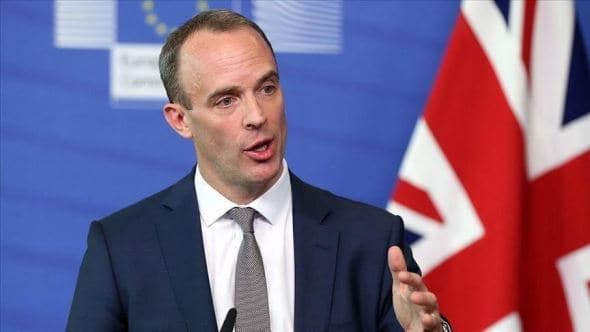
02-03-2020 at 9 PM Aden Time
Dramatic Houthi rebel advances and threats to end humanitarian aid in Yemen will lead Dominic Raab’s agenda when he makes his first visit to Saudi Arabia on Monday.
The British foreign secretary will also travel to Muscat later this week to meet the new Sultan of Oman, Haitham bin Tariq, to discuss his role in any mediation talks in Yemen.
The last few weeks have seen Houthi military victories on the borders with Saudi Arabia and, separately, warnings from aid agency USAid that it will stop working in Houthi-controlled parts of Yemen unless interference in the free distribution of aid ends.
An Associated Press investigation in February found about $133m of the $370m in UN-provided direct cash transfers to government institutions, mostly controlled by the Houthis, went unaudited.
The US has given the Houthis until the end of this month to relax their grip on UN aid relief. In a sign that the Houthis may respond to the pressure, the Houthis dropped a plan for a 2% tax on all aid. But critics said the Houthis are still trying to entrench their local political control by forcing UN agencies to let their generals make decisions over the distribution of UN aid.
| The UN special envoy for Yemen, Martin Griffiths, is working on a plan to bring together the Houthis, Hadi’s forces and the STC at some form of national talks
The US plan does not have the support of Saudi Arabia. Abdullah Al-Rabeeah, adviser to the Saudi royal court and supervisor general of the King Salman Humanitarian Aid and Relief fund (KSRelief), said he was sure the Houthis would try to hinder aid, and pressure should be put on them, but not in a way that “harms poor children, women or people at risk”.
Roughly 17 million people in Yemen are expected to be dependent on humanitarian aid this year.
To the alarm of Saudi Arabia, the Houthis confirmed on Sunday they have captured the strategically important Al-Hazam city, the capital of Al-Jawf province, which borders Saudi Arabia. It marks the Houthis’ first capture of an administrative city in two years in Yemen, and follows months of fighting. The province is thought to have the largest oil reserves in Yemen, and the Houthi success immediately led to Saudi air strikes. However, throughout the five-year civil war Saudi Arabia has not been able to translate air superiority into success on the ground.
Raab is expected to meet the president of Yemen’s UN-recognised government, Abdrabbuh Mansour Hadi, in the Saudi capital, Riyadh, to discuss the war effort, including the Saudi mediation to bring together Hadi’s forces and those of the separatist Southern Transitional Council (STC). The Saudis brokered an agreement between the two sides in the south but it seems largely unimplemented, leaving the forces arrayed against the Houthis still badly divided.
The UN special envoy for Yemen, Martin Griffiths, is working on a plan to bring together the Houthis, Hadi’s forces and the STC at some form of national talks. The Houthi military advance will strengthen its hand in those talks, and critics of Griffiths said he has been too accommodating to the Houthis at a time when they will not end their offensive.
Raab’s aides said he will also raise restrictions to free expression and human rights in Saudi Arabia, an oblique reference to the murder of the Washington Post columnist Jamal Khashoggi in the Saudi consulate in Istanbul more than a year ago.
Britain has said its future relations with Saudi Arabia will depend on how the kingdom handles the killing and the degree to which Britain has confidence such an event will not reoccur.
The UK is eager to get co-operation with Riyadh back on track partly because, as chair of the UN climate change conference in November, the country needs to work closely in tandem with Saudi Arabia – the chair of this year’s G20.
Source: The Guardian
Previous article